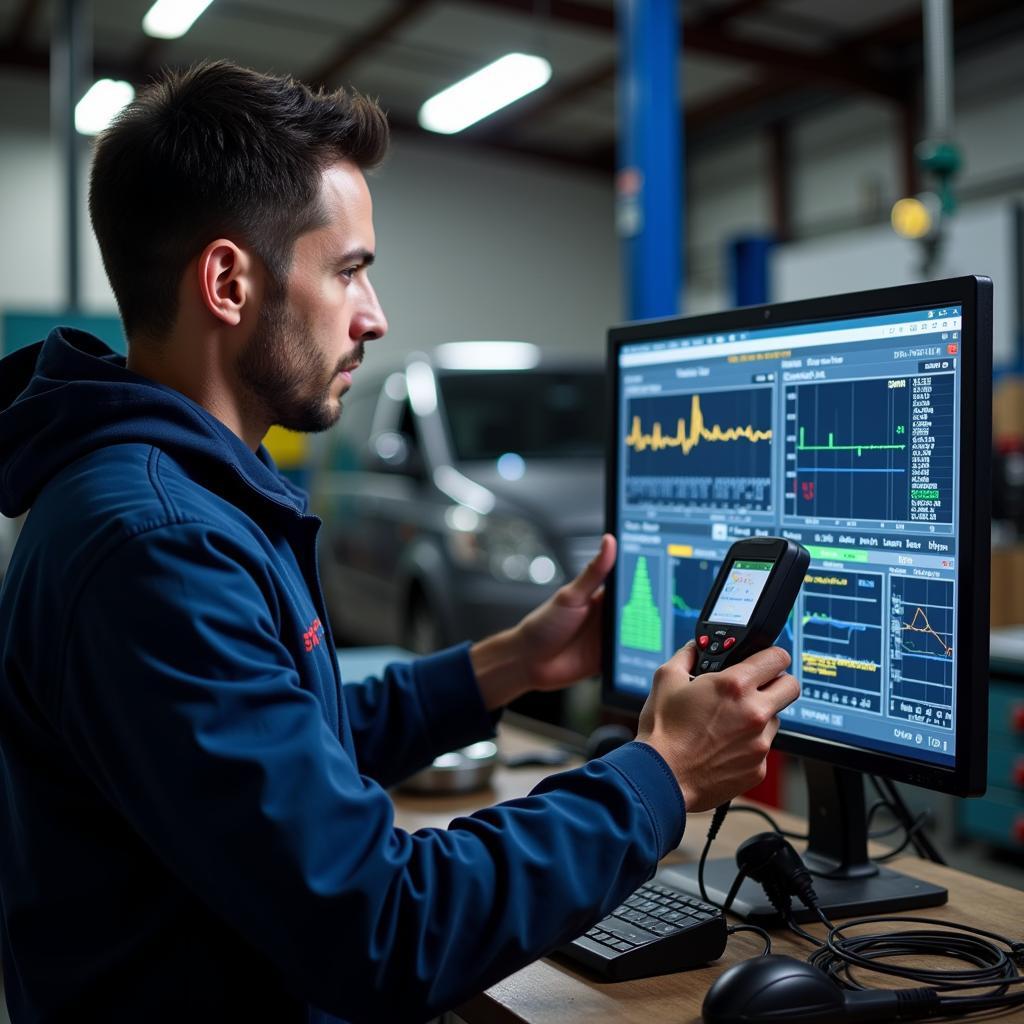Car diagnostics have revolutionized the way we approach vehicle maintenance and repair. Gone are the days of relying solely on a mechanic’s intuition. Today, sophisticated systems pinpoint issues with remarkable accuracy, providing a clear roadmap for repairs and saving both time and money. This comprehensive guide delves into the world of car diagnostics, exploring its importance, benefits, and what you need to know.
What are Car Diagnostics?
At its core, car diagnostics involve using advanced electronic equipment to communicate with your vehicle’s onboard computer system. This system, also known as the Engine Control Unit (ECU), continuously monitors various sensors placed throughout your car. These sensors collect crucial data on everything from engine performance and fuel efficiency to emissions and safety systems.
When a problem arises, the ECU logs a specific Diagnostic Trouble Code (DTC). Car diagnostics tools can then read these codes, translating them into understandable terms that pinpoint the source of the issue.
Why are Car Diagnostics Important?
Car diagnostics are not just for mechanics anymore. Here’s why understanding them can be beneficial for all car owners:
- Early Detection: Think of car diagnostics as an early warning system. They can identify problems before they escalate, saving you from costly repairs down the line.
- Accurate Diagnosis: No more guesswork! Diagnostic tools provide specific information, eliminating unnecessary repairs and ensuring you address the root cause of the problem.
- Improved Safety: By monitoring vital safety systems like airbags and anti-lock brakes, car diagnostics play a crucial role in ensuring your vehicle is safe to drive.
- Increased Resale Value: Regular diagnostics and maintenance records demonstrate to potential buyers that your car has been well-cared for.
What Can Car Diagnostics Detect?
The range of issues that car diagnostics can detect is vast, encompassing:
- Engine Problems: Misfires, fuel system issues, oxygen sensor malfunctions, and more.
- Transmission Issues: Slipping gears, rough shifting, and other transmission-related concerns.
- Brake System Faults: Problems with ABS, brake fluid levels, and other braking components.
- Emissions System Issues: Catalytic converter problems, evaporative emissions control system faults.
- Electrical System Problems: Battery health, alternator performance, wiring issues.
 Mechanic Using Diagnostic Scanner
Mechanic Using Diagnostic Scanner
Types of Car Diagnostic Tools
A range of car diagnostic tools are available, from basic code readers to professional-grade scanners.
- Code Readers: Affordable and easy to use, code readers can retrieve and display DTCs.
- OBD-II Scanners: More advanced than code readers, OBD-II scanners offer live data stream readings, allowing you to monitor various engine parameters in real-time.
- Professional Diagnostic Scanners: Used by mechanics and technicians, these sophisticated tools offer comprehensive diagnostic capabilities, including bi-directional control over vehicle systems.
DIY vs. Professional Diagnostics
While basic code readers empower car owners to do some troubleshooting themselves, professional diagnostics often require specialized knowledge and equipment. For complex issues or when in doubt, it’s always best to consult a qualified mechanic.
The Future of Car Diagnostics
As technology continues to evolve, we can expect even more advanced and user-friendly diagnostic tools. The integration of artificial intelligence (AI) and machine learning is poised to take car diagnostics to the next level, offering predictive maintenance suggestions and further streamlining the repair process.
Conclusion
Car diagnostics have transformed the automotive landscape, providing a powerful tool for understanding and maintaining our vehicles. By embracing this technology, car owners can enjoy greater peace of mind, make informed repair decisions, and ensure their vehicles stay in optimal condition for years to come.
Frequently Asked Questions about Car Diagnostics:
- What is the OBD-II port? The OBD-II port, typically located under the driver’s side dashboard, provides access to your vehicle’s ECU.
- How often should I get a car diagnostic check? It’s recommended to get a diagnostic check annually or if you notice any unusual vehicle behavior.
- Can I reset a check engine light with a code reader? Yes, but it’s crucial to address the underlying issue causing the light to illuminate.
- Are all car diagnostic tools compatible with all car models? No, compatibility varies depending on the tool and vehicle make and model.
- Can car diagnostics detect problems with the infotainment system? Yes, some diagnostic tools can detect issues with certain infotainment systems.
For further assistance, feel free to reach out to our team of experts via WhatsApp: +1(641)206-8880, or Email: [email protected]. We’re available 24/7 to provide guidance and support.
Explore our comprehensive resources on the latest car diagnostic tools and services:
Don’t hesitate to contact us for all your car diagnostic needs!

Leave a Reply